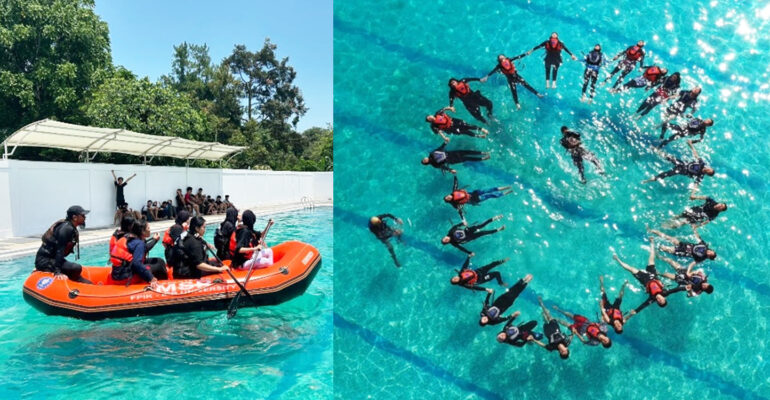IPB University’s MSP Department Holds Sea Survival Training, Providing Students with Work Safety Skills in the Aquatic Environment

The Department of Aquatic Resource Management (MSP), Faculty of Fisheries and Marine Science (FPIK) IPB University held another Sea Survival Training, recently. The training is open to all students, whether they can swim or not.
This activity is a routine program that has been carried out since 2012 and is part of the Occupational Health and Safety Training in the Field (K3L).
This training is intended to equip students with important knowledge and skills related to work safety when carrying out activities in aquatic ecosystems, both in inland waters and marine waters.
Prof Hefni Effendi, the Chairman of MSP Department at IPB University, said that through this training, participants will be taught various safety skills that are very important.
“Participants are trained on the correct use of life jackets, the use of rubber boats, safe techniques for jumping into the water from a height, and how to form a safe formation in the water while waiting for the rescue team,” he said.
In addition, he continued, participants were also taught about group movements on the water surface and how to give signals to search and rescue (SAR) teams in helicopters or passing aircraft.
“For those who have a fear of water, don’t worry. Take this training, and you will gain a lot of valuable knowledge and benefits,” he said.
Prof Hefni said that this training is very important, especially for those who will have a career in the offshore oil and gas industry. In such jobs, a sea survival training certificate is the main requirement.
Furthermore, he explained that other certifications, such as T-Bosiet, Huet, and Life Support are also a must for professionals in the sector. Therefore, the skills acquired in this training are very useful for various other fields, such as natural resource management, conservation, and aquatic environment ecotourism.
“With these basic sea survival skills, students will have an advantage in knowledge and skills that will be very useful in the world of work,” he said.
Not enough theory, the trainees immediately practiced sea survival skills at the Aquatic Center, IPB University. In this session, students were trained in self-saving techniques in the event of an accident working or traveling at sea (offshore).
In collaboration with Yayasan Rekam Nusantara, the instructors who led the training session were Wahyu Mulyono, an alumnus of the MSP Department of IPB University and his colleague, Anwar Suwandi.
Wahyu emphasized that the correct use of a life jacket is very important. “With this tool, anyone who is thrown into the water, be it freshwater or sea water, will float. What needs to be considered is to stay calm and not panic,” he said.
Interestingly, in this training there were participants who initially could not swim and were even afraid of water. However, with guidance from experienced instructors, they managed to overcome these fears and were able to follow the entire training session well.
With this training, students of the MSP Department of IPB University are expected to be ready to face challenges in the field with adequate safety skills. (*/Nr) (IAAS/ZQA)



